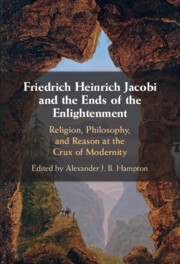 Friedrich Heinrich Jacobi and the Ends of the Enlightenment
Friedrich Heinrich Jacobi and the Ends of the Enlightenment from Part I - The Critique of Reason: Debates on Rationalism, Empiricism, and Skepticism
Published online by Cambridge University Press: 09 February 2023
This analysis of Jacobi’s pivotal Spinoza Letters illustrates that the driving force behind his innovative altercation with Spinoza lies not in religious motives, but rather in motives derived from the philosophy of action. By putting into effect the contradiction between system and freedom in the practical sphere, Jacobi opened up new perspectives in modernity’s own self-understanding.
To save this book to your Kindle, first ensure no-reply@cambridge.org is added to your Approved Personal Document E-mail List under your Personal Document Settings on the Manage Your Content and Devices page of your Amazon account. Then enter the ‘name’ part of your Kindle email address below. Find out more about saving to your Kindle.
Note you can select to save to either the @free.kindle.com or @kindle.com variations. ‘@free.kindle.com’ emails are free but can only be saved to your device when it is connected to wi-fi. ‘@kindle.com’ emails can be delivered even when you are not connected to wi-fi, but note that service fees apply.
Find out more about the Kindle Personal Document Service.
To save content items to your account, please confirm that you agree to abide by our usage policies. If this is the first time you use this feature, you will be asked to authorise Cambridge Core to connect with your account. Find out more about saving content to Dropbox.
To save content items to your account, please confirm that you agree to abide by our usage policies. If this is the first time you use this feature, you will be asked to authorise Cambridge Core to connect with your account. Find out more about saving content to Google Drive.